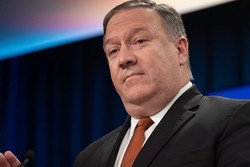 An imminent Middle East tour US Secretary of State Mike Pompeo is to go on with the hope of rallying support around Washington’s anti-Iran policies is another “useless” mission, says an American analyst.
An imminent Middle East tour US Secretary of State Mike Pompeo is to go on with the hope of rallying support around Washington’s anti-Iran policies is another “useless” mission, says an American analyst. RNA - James Petras, a writer and a former academic, told Press TV in an interview on Sunday that the US top diplomat would be futilely trying “to create the image (during the tour) that the [US] policies have been successful.”
Pompeo will begin the five-day tour on Tuesday. It will take him through Kuwait, Israel, and Lebanon. According to the US State Department, he will discuss security issues in the region and emphasize the “threat” from Iran.
"The common thing in each of those places is helping those countries bolster their efforts to push back against the Islamic Republic of Iran," Pompeo told Fox News on Thursday.
Petras described US policies as a "disaster," saying, “They have to change their policies and as long as they allow…[US National Security Adviser John] Bolton and Pompeo to make policy, I think they will become known as the masters of defeat.”
Bolton, another known Iran hawk, has likewise been upholding and even trying to reinforce the Trump administration’s anti-Iran rhetoric and actions.
In Lebanon, the US secretary of state plans on discussing the resistance movement Hezbollah, whom Washington accuses of receiving Iranian arms support. Tehran has thrown vocal support behind Hezbollah’s role in pushing back against Israeli interventions in Lebanon, but has invariably rejected Washington’s allegations of arming the group.
Petras said, “Pompeo is operating with the weak hand. He will go to Lebanon, but Hezbollah will neutralize any influence that the US has with the government there.”
The US’ efforts, however, have failed to adversely affect Iran’s relations with many key regional and international players, he added.
He noted that Iran had retained its relations with the European Union, which coordinated the talks leading to the nuclear agreement - reached between Tehran and the P5+1 - and has joined the international chorus against the US’ betrayal of the deal.
The pundit was referring to Washington’s decision last May to unilaterally and illegally pull out of the 2015 accord, which had Iran, the UK, France, Russia, China, and Germany as its other signatories. The rest of the parties to the contract, which came as a result of marathon talks, call it a pillar of regional and international peace and security, and censure Washington over its withdrawal from the accord that has been ratified in the form of a UN Security Council resolution.
The analyst also reminded that the Islamic Republic had also been able to develop deeper ties with Iraq and Lebanon - particularly Hezbollah - India, China, and Russia.
“So, in effect, on every count, the Trump administration and Pompeo thought that by taking a hard line, they would force the government in Iran to capitulate, whatever that means, essentially disarm and leave itself open to naval and air missile attacks from US and Israel,” he noted.
847/940